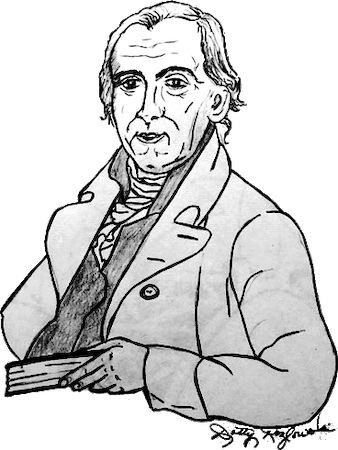Jared Ingersoll Esq., 1722-1781, son of Jonathan Ingersoll and his third wife, Sarah (Newton) of Milford, was born in 1722 and baptized June 3, 1722 at the Milford First Church, where he was admitted to full communion Aug. 1, 1742. Jared, graduated from Yale in 1742 and by his diligence was awarded a year at Yale as Berkeley scholar. He then commenced to practice law in New Haven where he settled.
He married Mrs Hannah Whiting daughter of Joseph and Hannah (Trowbridge) Whiting on August 1, 1743 at the first Church in Branford and they became members of the New Haven First Congregational Church. They had three surviving Children, Jared Ingersoll (the second and surviving child of that name), born April 21st, 1748, who went on to also practice Law, become Pennsylvania Attorney General and a founding signer of the US Constitution. Hannah died Oct 8, 1779 at a age 66. Jared and Mrs. Hannah Alling, daughter of Samuel & Sarah (Woodward) Miles and widow of Enos Alling were married Jan 9, 1780. Jared died the following August 25, 1781.
By 1757 he held the office of King's Attorney, and in May 1758 the Connecticut colonial legislature appointed him agent to the English court in London, mainly to negotiate reimbursement for recent expenditures in the French and Indian War. In May 1760, he resigned and returned to Connecticut. In October 1764, he returned to England to sell a load of masts from the Connecticut River as agent and principle of a disfavored Connecticut lumber company. Their New Hampshire rival got the Admiralty business.
Ingersoll made the best of the business failure by working as Agent of the New Haven Colony with arguments he helped prepare for Parliament against the Stamp Act. It did pass in spite of his and the efforts of other Colonials. When the act became law, again making the best of a bad situation, Ingersoll accepted the position of Stamp Master of Connecticut, allegedly on advice of Benjamin Franklin. He thus became tax collector for the hated law. In 1765, he arrived in Boston as stamp agent for Connecticut and soon after authored a pamphlet titled “Stamp Act” (New Haven, 1766) explaining its need and merits to a doubting populace.
Throughout Connecticut there was a great deal of dissension and anger, both verbal and in the newspapers, directed at the Act and Ingersoll personally. Jared wrote spirited letters of defense but attacks escalated into demonstrations and threats of physical violence. Ingersoll, assured of the governor's protection, tried to reason with the people of New Haven. His arguments were not ultimately successful as neighbors surrounding his house, demanded he resign. “I know not if I have the power to resign,” he replied. He promised, however, that he would return any stamps that he received or leave the matter to their decision. He was finally compelled to offer his resignation. His actions did not satisfy the people of Connecticut so in order to save his house from an attack, he placed himself under the protection of the legislature in Hartford.
On September 23, 1765, Ingersoll rode from New Haven toward Hartford hoping for protection and to register a complaint at the general assembly called by Governor Fitch on the 19th. Near Wethersfield he met a band of 500 eastern Connecticut men preceded by three trumpeters and two militia officers. They rode with him to Wethersfield intending to compel him to resign his office. Entering a house for safety, he sent word of his situation to the governor and the assembly. After three hours they entered the house. Ingersoll, being a wise and educated man found “the cause is not worth dying for.”
Under duress he made a written declaration that his resignation was his own free act, without any equivocation. Nevertheless, he refused to "Swear" to it. He was ordered to shout three times “Liberty and Prosperity” (also recorded as "Liberty and Property") and throw his hat in the air. He wisely accommodated the request before he and the growing troop of about 1000 marched on to Hartford to confirm his resignation. Governor Fitch would later nullify his resignation and issued a proclamation against the rioters. The Public was not amused and attacks, apparently without violence, continued. The restored stamp tax collector again surrendered his office the following January before a Justice of the Peace. The reaction of the people to the Stamp act was a first hint of the dissatisfaction to come when loyal Colonists would become revolutionary Americans.
Ingersoll was appointed by the King to be Judge of the Vice Admiralty in the Middle District of America (South of NY and North of VA) in 1770, as a sort of compensation from the Crown for his ordeal in Connecticut. It was one of the permanent four districts and one of the most important offices ever held by anyone from Milford (Unless you include Bill Clinton's residency here while at law school). He removed his family to Philadelphia in 1771 where he worked as a judge until hostilities began. Then, for the first two years of the American Revolution he resided in seclusion in Philadelphia. As British General Howe approached the city he, under duress of yet more patriots, he returned to New Haven where he remained until his death. He never left his beloved land despite serving the king for much of his life. Most "Tories," as some called him, fled the country after the successful revolution or were forced to leave penniless.
As a lawyer, some of his cases were memorable. In addition to representing Connecticut lumber interests in England, Ingersoll defended Benedict Arnold for the whipping of one "informer Boles" who ratted out Arnold's smuggling activities. He also served on the NY- NJ Border commission and as agent for Lord Stirling's settlement of the Penobscot area of Maine, then part of Massachusetts.
Remarkably for a colonial tax collector who was routinely hung in effigy, Jared Ingersoll’s memorial boasts the most lavish praise found on any stone in the crypt, in part:
"...A man of an uncommon Genius …
He distinguished himself at the Bar ... twice honoured ... At the court of Great Britain.
His Morals were unblemished ... Sagacious ...sincere, mild, affable, and courteous.
Adapting himself to all …
Yet preserving in his whole Behavior
A graceful and majestic Dignity..."



